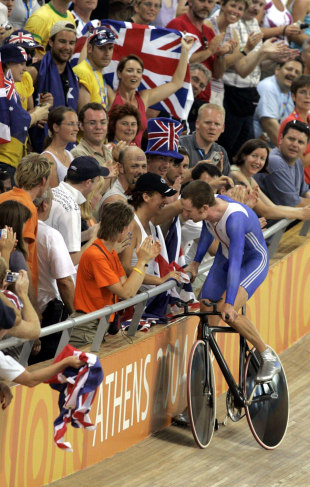- London Olympics 2012: Ten things
Tarzan and trains

Each day of the Games we will bring ten facts you may or may not know about the great sporting spectacle that is the Olympics. Today we have amazing feats in the pool and on the bike
The men's 100m freestyle, arguably the blue riband event in the pool, climaxes today. This was the event won in both 1924 and 1928 by Johnny Weissmuller, who went on to become still the most famous portrayer of Tarzan on screen, while the two Games before that - 1912 and 1920 - saw the gold go to the Hawaiian Duke Kahanamoku, one of the pioneers of surfboarding. Since then the only men to retain the title have been Alexander Popov of Russia (1992 and 1996) and the Dutchman Pieter van den Hoogenband (2000 and 2004).
The women's 200m butterfly was the scene of one of the all-time great swims in an event in 1981, when 16-year-old Mary T. Meagher - from Muhammad Ali's home town of Louisville, Kentucky - lowered the world record by 1.33 seconds to 57.93. She'd been kept out of the 1980 Moscow Olympics by the American boycott, but stormed home to win in Los Angeles in 1984. Meagher's world record stood for 18 years, before it was broken in 1999 by Jenny Thompson - another American, and one fated to win eight Olympic gold medals, but all in relays, none in individual events.
The 200m breaststroke was the event in which David Wilkie stormed home to win in world-record time in Montreal in 1976, more than two seconds clear of the 100m champion, John Hencken of the USA. Wilkie, a Scot who was actually born in Sri Lanka, is credited with being the first male swimmer to wear a cap and goggles during competition, to reduce "drag" in the water.
History beckons for Bradley Wiggins in the men's time trial at Hampton Court: a medal of any sort would be his seventh, a record for any British Olympian (Steve Redgrave also has six). Wiggins, the winner of the 2012 Tour de France - in which he won two of the time-trial stages - will obviously be looking to make it a fourth gold, to go with the ones he won on the track in Athens and Beijing.

Wiggins and Co. probably won't have to put up with the problems that faced the riders in the 1920 time trial in Antwerp, when the course included six busy railway crossings. Officials were stationed at each one to record time lost to passing trains. At the end it appeared that Henry Kaltenbrun of South Africa had won, but later the timekeepers confirmed that a Swede, Harry Stenqvist, had been held up for four minutes by a train, which gave him the gold medal.
High hopes for Britain too in the women's time trial, which precedes the men's one: Emma Pooley won silver in Beijing. This event was only added to the Olympic roster in 1996, when Jeannie Longo-Ciprelli of France won silver to go with gold in the road race. She was third in the time trial in 2000, and in Beijing in 2008 - by which time she was nearly 50 - Longo-Ciprelli was agonisingly close to another medal, finishing just two seconds out of the medals in fourth place.
The women's table tennis champion will be decided today. Since table tennis was added to the Olympics in 1988, the women's singles has always been won by China: Deng Yaping took gold twice, in 1992 and 1996, while Zhang Yining won in 2004 and 2008. At Sydney in 2000 eleven other nations included table-tennis players born in China.
At Eton Dorney today it's the final of the men's eights, an event won by Britain in 1908 and 1912, but then not till Sydney in 2000. In between the event was mainly the preserve of the Americans, whose winning team in Paris in 1924 included Benjamin Spock, later (as "Doctor Spock") the author of a famous childcare textbook.
The big boys are in action today in the boxing ring at the ExCeL: both the heavy and super-heavyweight categories have bouts scheduled. The super-heavyweight class was added in 1984: Lennox Lewis took gold (for Canada) in Seoul in 1988, beating another future world heavyweight champion, Riddick Bowe, in the final. Before that the great Teofilo Stevenson - who sadly died earlier this year - won the heavyweight title three Games running from 1972, an accomplishment equalled by his fellow Cuban, Felix Savon, between 1992 and 2000.
At Wembley today the Great Britain men's soccer team takes on Uruguay, a rerun - or near-rerun, anyway - of England's first match in their successful 1966 World Cup campaign. That was a quiet start to a memorable tournament: a goalless draw.

